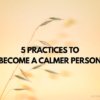
Empathy is the ability to put oneself in another person’s shoes, to feel what they feel, and to understand life from their point of view – and therefore empathy is a highly adaptive, pro-social trait!
But if you are not careful, having too much empathy can quickly turn into a highly negative trait. How so? For starters, when you have too much empathy, a large chunk of your energy is directed outwards. This creates an imbalanced state which will leave you feeling drained and dissatisfied with your life in the long run. This is certainly not ideal for your mental and physical well being.
So if you believe you have too much empathy and that it is beginning to impact your life negatively then this article will help you put things into perspective while offering you practical tips on how you can become less empathetic and get back into balance.
This will transform your life, so let’s begin by first looking at some definitive signs that you have too much empathy.
5 signs you have too much empathy
1. You feel resentful of those around you
Do you find yourself feeling irritated every time you help someone? Do you notice yourself anticipating an outpouring of thanks from those you’ve helped, only to feel bitter when you don’t receive what you expected? If so, you may be expending too much of your empathetic energy.
2. You trust others’ feelings or perceptions before your own most of the time
Many highly empathetic souls tune into others’ feelings without ever listening to their own. As an example: let’s say you hired a personal trainer. After your time with them ends, you decide not to book any more sessions– yet, upon telling them that you’re considering not continuing, you sense that they feel upset about this. Thus, you decide to pay them for more sessions, despite not even wanting to.
3. You have poor self-image
If you’re empathetic to the point of self-destruction, you may base your self-worth upon what you can do for other people. This inevitably leads to poor self-image; there’s not enough time in a day to do everything for everyone, and as a result of your distorted self-perception, you likely end up feeling unworthy when you can’t help everybody in your life.
4. You struggle to make decisions for yourself & ask for advice about even small decisions
You may have let your parents decide for you what college you were going to attend. You always let your partner decide what’s for dinner. You may even let other loved ones choose your family doctor, your gym, your children’s schools, or perhaps your career path. If you find that you cannot make a decision without getting advice, or that you let other people decide everything in your life for you, you’re likely trying to avoid upsetting or disappointing anyone. This is a sign of overactive empathy.
5. You communicate passive-aggressively
This ties in with my first point of resentment. As an overly empathetic person, you don’t feel that your needs matter; yet, you are human. You can’t help but have those needs. Therefore, even though you try to push them down, your needs come out in a passive-aggressive fashion. For example: “I guess I have to do everything myself in this house!”
7 downsides of having too much empathy
Before we look at the ways that will help you become less of an empathy, let’s first see a few of the major downsides of having too much empahty.
1. You develop codependent relationships
If you’re overly empathetic, your relationships center around making the other person happy. You anticipate their needs, mirror their moods (i.e. you’re unable to be happy when they’re upset), and you spend a majority of your free time trying to please or fix them.
2. You don’t practice enough self-care
You feel guilty taking a bath or going for a walk to recharge, because that time could be spent helping somebody. However, when you don’t practice self-care, you give from an empty cup – meaning that you likely feel exhausted or irritable most of the time.
3. You don’t value your own thoughts, feelings, or beliefs
Again, you may live your life in fear of disappointing your loved ones. As a result, your thoughts, feelings, and beliefs take a backseat.
For example: it doesn’t matter if you wanted to eat something nutritious tonight, because your partner wants pizza, and they’d be unhappy if you took them to a salad bar. To the overly empathetic person, compromise doesn’t exist; it’s all about doing what other people want, all the time. You never put yourself first.
4. Communication in your relationships may suffer
Clear communication is key to maintaining a healthy relationship, but in your relationships, you fail to speak up. Your family or friends don’t know what you want or need, and so they struggle to deliver those things to you. In addition, overly empathetic people may sometimes assume what others need without fully listening to them. If this is you, you may find your family or friends feeling “smothered” or needing space from you.
5. You don’t feel as if your life is “yours”
When people ask you what your interests are, or what you like to do for fun, you don’t know how to answer– you simply always do whatever your friends are doing, whether it’s “fun” for you or not. When people ask why you chose the career you chose, you have no response, because you didn’t choose that career– somebody else did. As a result, you feel like you’re living someone else’s life, rather than your own.
6. You don’t know what your boundaries are or how to enforce them
The word “boundaries” may sound abstract to you. You may believe that you don’t have or don’t need boundaries. When a loved one acts in a way that makes you uncomfortable, you simply smile and go along with it, stuffing down any anger or hesitation which arises. You couldn’t imagine ever telling your loved ones “no” or speaking up about how you truly feel. To you, doing so may feel “selfish”.
7. You become emotionally reactive and irritable
This once again follows from my point about resentment. Helping everybody and failing to practice self-care will leave you feeling exhausted, whether it’s mentally, physically, or both. As a result, you may find yourself snapping at your loved ones over small matters.
8 Ways to be less empathetic
Based on the above points do you feel that you have too much empathy? And do you think it is effecting the quality of your life (and sometimes even others around you) negatively? If so, here are 8 things you can do to change this, get into balance and transform your life.
1. Pay attention to your emotions; name them if possible
You may not be fully in tune with your own emotions if you’re overly empathetic. Begin to pay attention to your feelings; as you witness and learn more about your emotional body, you’ll begin to understand how much you truly can help somebody before you need to tend to yourself.
If possible, when you feel something, name it. If you don’t know what you’re feeling, name your physical sensations, or even make up a name for what you feel!
2. Learn what your boundaries are and gradually begin to practice setting them
In order to learn what your boundaries are, you must practice the above step first: paying attention to your feelings. Then, you can understand which helping behaviors feel comfortable, and which ones feel uncomfortable.
Gradually begin setting boundaries around those helping behaviors which feel uncomfortable. For example, you may try saying something like: “I’m sorry, but I can’t pick up your kids from school tomorrow; I have a lot on my plate and I don’t want to overwhelm myself.”
3. Do your best not to “fix” or “rescue” others
As an empathetic individual, you may draw in people who need “rescuing”, and at first, it may feel good to “help” them. While it’s totally fine and amazing to be a listening ear to a friend in need, notice when you’re trying to fix your friend’s entire life – rather than listening to them and then empowering them to make their own changes.
4. Practice self-care
This may be the most important item on this list! Practice self-care before you begin to feel exhausted or resentful.
If you can, practice self-care every day, even if it’s just for five minutes: you may try sitting in silence, light reading, or enjoying hot tea, to name a few ideas.
5. Listen before you assume what somebody needs
Again, do you often try to “fix” your friend’s entire life when they’re in pain? If so, you may be ignoring what your friend is actually asking for. In many cases, this person just wants you to listen to them, kindly and non-judgmentally.
Remember that you are of incredible service to them just by listening quietly, and that if at any point, you feel like the conversation has drained you, you can take a break!
6. Prioritize self-development by discovering what you truly want out of life
To reiterate, you might have allowed other people to live your life for you. Luckily, it is never too late to get to know yourself and discover what you want!
You may try meditation, journaling, or working with a life coach to help you discover your true wants, needs, and values, so that you can live your most fulfilling life.
7. Discern draining empathy from helpful empathy
As I mentioned earlier, empathy is good! Healthy empathy helps us to develop deep relationships. There is, however, a fine line between helpful empathy, and draining empathy.
When you’re helping someone, notice: do you feel exhausted, resentful, or bitter afterwards? If so, you may have drifted into draining empathy territory.
To counteract this, practice listening to your feelings and setting boundaries the next time you help this person.
8. Learn to let go of what you can’t control
When we empathize too much, we often try to control others or their surroundings. For example: you may try to “fix” two people’s relationship with one another, struggling to get one to see the other’s point of view. You can’t actually control either of these people!
Your best act of empathy in a case such as this is, again, to listen non-judgmentally to both parties, without “fixing” or giving advice unless prompted, and allowing the relationship to either mend itself or fall apart on its own terms.
5 tips for protecting yourself as an empathetic person
Finally, here are some tips to protect your energy as an empathetic person.
1. Trust your gut
This goes along with becoming aware of your emotions. Have you ever had a conversation with someone and suddenly noticed that your stomach was in knots or your head was aching? When you experience discomfort during a conversation, it may be a sign that you need to set a boundary: end the conversation, walk away, take a breather, or limit time spent with that person.
2. Carry selenite, or a grounding crystal such as black obsidian or hematite
Crystals offer massive protective powers for empathetic people. For example, some consider selenite to be the most protective crystal on Earth; for that reason, you may want to carry a selenite wand with you!
Grounding stones can help, too, as they keep you connected to your body and your emotions, wants, and needs. Carrying black obsidian or hematite can offer protective benefits.
3. Limit time spent with energy vampires
An “energy vampire” is someone who takes, emotionally, without giving. This person may talk your ear off about their struggles with their spouse, to the point where it feels like they’re laying emotional bricks on top of your heart; yet, when you need a listening ear, they push you away.
If possible, try limiting your time spent with these people. Practice self-care instead!
4. Meditate
Meditation raises your energetic vibration, and also naturally fine-tunes your relationship with yourself.
As you meditate, you get to know yourself, and therefore, you get to know your wants and needs. This will enable you to set the boundaries that you need in order to stay centered and nurtured.
5. Shield yourself with white light
Finally, you may try this energetic shielding technique which most empathetic people acclaim. Envisioning a bubble of white light around your body will prevent others’ negative emotions from seeping into your energy field.
As a result, you’ll be less swayed by their demands, disappointment, or anger– even if and when you say “no”.
Summing it up
All things considered, empathy is a heavenly trait, and our world needs more of it– but in balance with self-care and self-awareness. If you find yourself experiencing overactive empathy, don’t beat yourself up.
Simply take these steps to care for yourself, and you’ll likely find that you’re more able to care for those who truly need it!







